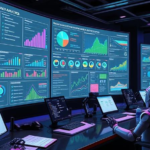
AI-Driven Campaign Management for Maximum Impact
March 24, 2025
AI for Customer Retargeting: Precision Remarketing
March 25, 2025Artificial intelligence (AI) is redefining content marketing, providing businesses with unprecedented capabilities to analyze data, predict trends, and create highly targeted content. In the digital era, where attention spans are shorter and competition for engagement is intense, marketers must adopt AI-driven solutions to remain competitive.
The traditional approach to content marketing involved extensive manual research to identify trends, audience interests, and high-performing topics. This process was time-consuming, prone to human biases, and often lagged behind real-time developments. AI eliminates these inefficiencies by processing massive amounts of data in seconds, offering actionable insights that help marketers craft content that resonates with their audience.
By leveraging AI, marketers can identify emerging trends before they become mainstream, personalize content for different audience segments, and optimize their strategies for maximum engagement and conversions. The integration of AI in content marketing is no longer optional—it’s essential for success in today’s fast-paced digital landscape.

The Role of AI in Modern Content Marketing
AI is revolutionizing every aspect of content marketing, from ideation and creation to distribution and performance analysis. The ability to automate tasks and analyze data at an unprecedented scale gives AI an edge in content marketing. Here are some key ways AI is shaping the industry:
Automating Content Creation
AI-powered writing tools like ChatGPT, Jasper, and Copy.ai can generate blog posts, ad copies, and social media content within seconds. These tools use Natural Language Processing (NLP) to produce high-quality, readable, and relevant content based on input prompts. While AI-generated content still requires human refinement, it significantly speeds up the content creation process.
Enhancing Audience Insights
AI can analyze vast amounts of user data to uncover patterns in behavior, preferences, and engagement levels. Machine learning algorithms examine how audiences interact with content, allowing marketers to fine-tune their strategies for better performance.
Optimizing Content Distribution
AI-powered platforms determine the best times to post content, the most effective channels for distribution, and the type of content that will perform well based on past interactions. This ensures that content reaches the right audience at the right time.
Personalization and Customization
AI enables hyper-personalization by analyzing individual user behavior and tailoring content recommendations accordingly. Platforms like Netflix, Amazon, and Spotify use AI-driven recommendations to increase user engagement and retention, a strategy that can be replicated in content marketing.

How AI Identifies Content Trends
The ability to predict and capitalize on emerging trends is crucial in content marketing. AI facilitates this process through advanced data analysis, pattern recognition, and sentiment analysis.
AI-Powered Data Analysis for Trend Prediction
AI continuously monitors data from search engines, social media, blogs, and news websites. By tracking search volumes, click-through rates, and user engagement metrics, AI can detect shifts in audience interest. This enables marketers to produce content that aligns with trending topics before they reach saturation.
For example, Google Trends and BuzzSumo use AI to analyze keyword trends, providing marketers with insights into what topics are gaining traction.
Role of Natural Language Processing (NLP) in Topic Discovery
NLP allows AI to process and understand human language, making it possible to analyze online discussions, reviews, and social media conversations. NLP-based AI tools extract key phrases and sentiments from text data, helping marketers identify topics that are resonating with audiences.
For instance, AI can analyze thousands of customer reviews and identify recurring themes, allowing businesses to create content that directly addresses customer pain points.
Case Studies of Brands Using AI for Content Trends
- Netflix: Uses AI to analyze user viewing patterns and recommend personalized content.
- Amazon: Leverages AI to predict purchasing behavior and create targeted marketing campaigns.
- The New York Times: Uses AI to determine trending news topics and optimize content distribution.
These case studies demonstrate how AI can be a game-changer in identifying trends and ensuring content remains relevant and engaging.

Tools and Technologies for AI-Powered Content Marketing
AI-driven content marketing tools help streamline research, optimize content, and enhance engagement. Here are some of the most effective AI-powered tools:
Content Research and Trend Analysis Tools
- BuzzSumo: Identifies high-performing content based on shares, engagement, and backlinks.
- Google Trends: Tracks search interest over time to determine trending topics.
- Exploding Topics: Uses AI to predict rising trends before they become mainstream.
AI-Driven Writing Assistants
- ChatGPT & Jasper: Generate high-quality articles, product descriptions, and marketing copies.
- Grammarly & Hemingway: Improve readability, grammar, and style.
SEO Optimization and Content Planning Tools
- Clearscope: Uses AI to recommend keywords and optimize content for SEO.
- Surfer SEO: Analyzes top-ranking content and provides optimization insights.
- MarketMuse: Uses AI to analyze content gaps and suggest improvements.
By integrating these tools, marketers can enhance their content strategy, save time, and increase engagement.

AI and SEO – Enhancing Topic Discovery
AI has transformed SEO by enabling smarter keyword research, better content optimization, and improved user experience.
How AI Improves Keyword Research and Search Intent Understanding
Traditional keyword research relied on manual analysis, but AI tools can now analyze search intent in real-time, ensuring content aligns with what users are actively searching for.
AI-Powered Content Gap Analysis
AI examines competitor content and identifies missing elements, allowing marketers to create more comprehensive, in-depth, and high-ranking content.
Predictive Analytics for High-Ranking Content Topics
AI can forecast which keywords and topics will gain traction, helping marketers focus on long-term content strategies.

AI for Personalization and Audience Targeting
AI-Driven Audience Segmentation
AI segments audiences based on demographics, behavior, and preferences, allowing for highly targeted content marketing.
Personalized Content Recommendations Using AI
Platforms like YouTube and Spotify use AI-driven recommendations to keep users engaged. Marketers can implement similar strategies to improve user retention and interaction.

Ethical Considerations in AI-Generated Content
While AI offers many advantages, ethical concerns must be addressed. AI-generated content can sometimes be biased or misleading. Marketers must ensure their AI tools are trained on diverse datasets and that human oversight remains a key part of the content creation process.
Best Practices for Using AI in Content Marketing
- Combine AI with human creativity to maintain authenticity.
- Use multiple AI tools for comprehensive insights.
- Monitor AI-generated content for accuracy and bias.
- Stay updated on AI advancements to remain competitive.
Conclusion
AI is revolutionizing content marketing by providing data-driven insights, enhancing personalization, and optimizing content for SEO. However, human creativity and ethical considerations remain crucial. By leveraging AI strategically, businesses can stay ahead of trends, create engaging content, and drive better results in the ever-evolving digital landscape.


